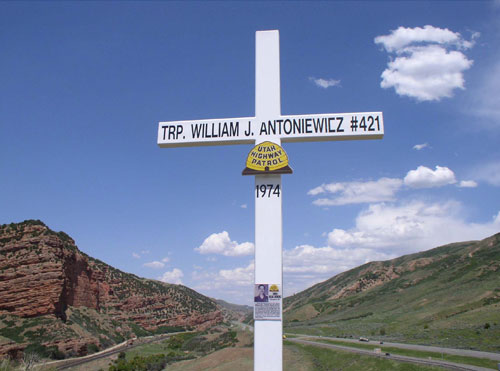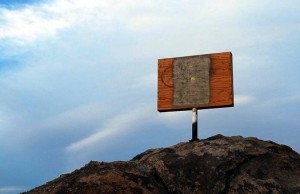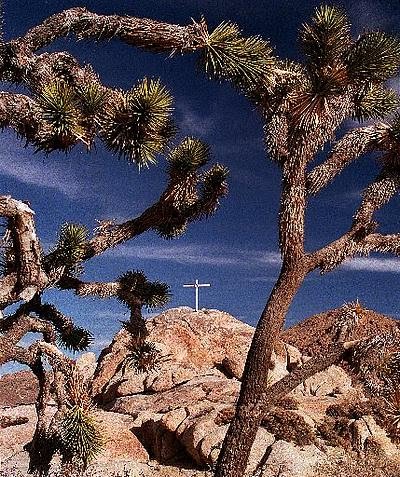
Utah Attorney General Mark Shurtleff asked the U.S. Supreme Court Wednesday to intervene in a case deciding the constitutionality of memorial crosses honoring fallen state troopers.
Shurtleff requested that the high court issue an opinion on the case after the 10th Circuit Court of Appeals ruled that the 14 crosses bearing the name of a fallen state troopers violate the U. S. Constitution.
Prior to the 10th Circuit Court’s ruling, the court had upheld the cross as a non-religious display for fallen employees.
“With two simple lines, the highway crosses remind us of the ultimate sacrifice made by troopers while trying to protect us,” said Shurtleff. “The crosses only establish a trooper died in the line of duty.”
The lawsuit against the 12-foot crosses was filed by American Atheists, Inc. in 2005. The group sued the Utah Highway Patrol Association, arguing that the cross is a universal symbol of Christianity and that the crosses’ placement on government property – highway right-of-way – violates the Constitution.

Meanwhile, a $125,000 reward has been posted by the Veterans of Foreign Wars and an anonymous veteran for the return of an 8-foot cross that has stood on top of a 30-foot rock outcropping in the Mojave Desert for 75 years.
The cross had been the object of an eight-year battle that made it all the way to the U.S. Supreme Court last year. In a 5-4 ruling, the Supreme Court ruled that the cross could stand.

Within hours of the ruling, the cross disappeared. The National Park Service, which had covered up the cross with a wooden box, claims that vandals had stolen the cross.
A veterans group that had spent millions of dollars to finally win approval for the cross by the Supreme Court then put up a duplicate cross – which the park service removed, claiming that the duplicate was not the historic cross protected by the court decision.
Park rangers at the Mojave National Preserve removed the replica replacement cross – declaring it was not covered by the Supreme Court decision.
The landmark ruling protecting the Mojave Desert cross was hailed as a severe defeat for the American Civil Liberties Union and other atheist groups attempting to remove all Christian symbols from the American landscape.

Now, allowing the vandals to win is unacceptable, said spokesmen for a number of Christian legal groups fighting to overturn the National Park Service’s refusal to allow a replacement.
“It’s appalling that vandals would remove a cross that has survived a constitutional challenge at the nation’s highest court,” declared Jay Sekulow, chief counsel of the ACLJ. “What’s even more troubling is the fact that the federal government is opposed to permitting a replica cross to be put in place. We’re calling on the Department of Justice to take the appropriate action without delay and permit the replica cross to be put up on Sunrise Rock.”
“This was a legal fight that a vandal just made personal to 50 million veterans, military personnel and their families,” said VFW National Commander Thomas J. Tradewell, Sr.
Veterans erected the cross in 1934 with a plaque stating, “The Cross, Erected in Memory of the Dead of All Wars.” Another plaque read, “Erected 1934 by Members of Veterans of Foreign Wars, Death Valley Post 2884.”
In 2001, the American Civil Liberties Union filed a lawsuit on behalf of Frank Buono, a former National Park Services employee. A district court and the U.S. Court of Appeals for the Ninth Circuit ruled that the cross and the land transfer violated the Establishment Clause and ordered it removed.
The cross was covered with a canvas bag, then a plywood box. On July 24, 2002, the U.S. District Court for the Central District of California found the presence of the cross on federal land to be a violation of separation of church and state and ordered it removed.
In 2003, the U.S. Congress moved to preserve the cross by enacting a one-acre land exchange that transferred the cross from federal to private ownership. Congressman Jerry Lewis (R-California) inserted the land exchange as an amendment to the 2004 Defense Appropriations Act.
On April 5, 2005, the very same U.S. District Court for the Central District of California held that the land exchange had been a “sham” amounting to an “attempt by the government to evade the permanent injunction enjoining the display of the Latin cross” on federal land.
On April 28, 2010, six of the nine U.S. Supreme Court justices wrote separate opinions in the case. Justice Anthony M. Kennedy announced the court’s decision and gave his opinion, which Chief Justice John Roberts Jr., and Justices Antonin Scalia, Clarence Thomas and Samuel Alito Jr. supported.
Justice John Paul Stevens dissented along with Justices Ruth Bader Ginsburg, Sonia Sotomayor and Stephen Breyer.
“Americans want memorials to our nation’s fallen heroes protected,” said American Defense Fund Senior Counsel Jordan Lorence. “Congress was doing just that when it transferred the land under this memorial to the veterans’ group that cares for it.”
Looking at the pictures of the site where the cross once was, VFW spokesman Joe Davis said he was amazed at the serious planning and execution that went into the theft.
The cutting of the thick, metal pipes set in concrete was a serious undertaking, he says. When he first saw photos of the vandalized cross site, Davis says he was “in shock and disbelief. How could anyone have the audacity to tear down a war memorial to the dead?”
Davis says that the original constructors erected the cross out of respect for Americans who died during World War I.
“Three of the highest medals in our armed forces use the cross – the Distinguished Service Cross, the Air Force Cross, and the Navy Cross – and no one has ever returned one of those,” says Davis. “This memorial meant a lot to those veterans.”
A number of Christian legal groups, including the ACLJ and the Liberty Legal Institute have protested the park service’s refusal to allow anyone to replace the stolen cross that has long stood on an outcropping known as Sunrise Rock.
“Passive displays like the World War I Memorial, the Ten Commandments, Nativity scenes, or statements like the National Motto do not force anyone to participate in a religious exercise and, thus, do not establish religion,” commented Mathew Staver, founder of Liberty Counsel.
Ranger Linda Slater, a spokeswoman for the Mojave National Preserve, said a maintenance worker spotted the replacement replica cross, which was a half-inch larger than the original one, she said.
Slater said the new cross wasn’t covered by the Supreme Court ruling, so it was removed.

